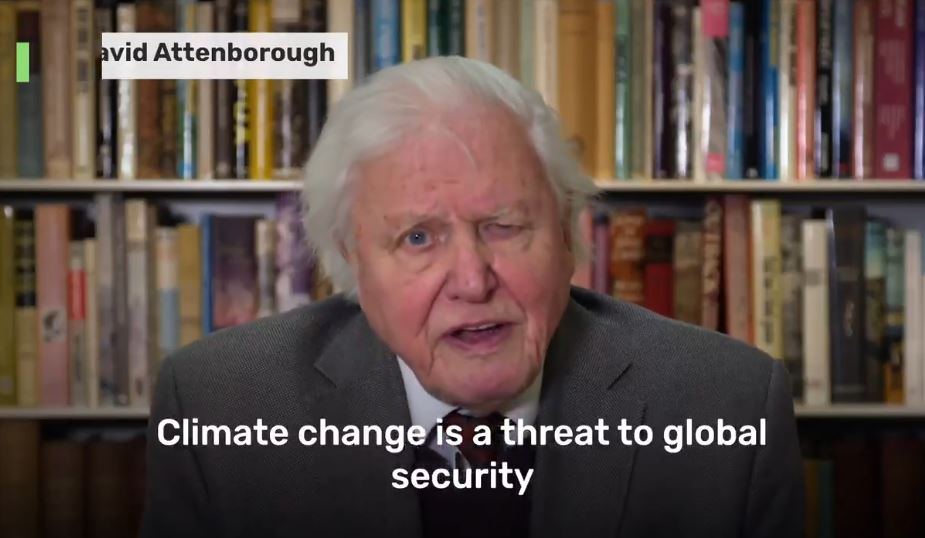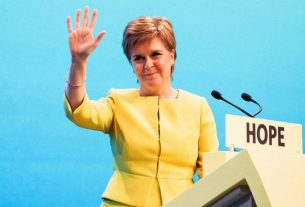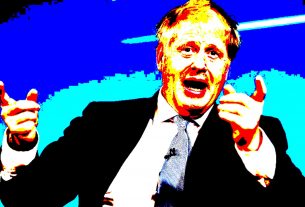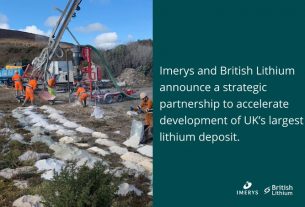Sir David Attenborough issued a stark warning to world leaders that humanity’s future is at a tipping point in an historic address to the UN Security Council.
The nonagenarian broadcaster and environmentalist said “climate change is the biggest threat to security that modern humans have ever faced,” one that may “destroy entire cities” and “alter the stability of the entire world” without massive and immediate intervention.
‘No matter what we do now, it’s too late to avoid climate change, and the poorest and most vulnerable, those with the least security are now certain to suffer,” the 94-year-old told the first ever UN Security Council session on climate and security, which was chaired by Boris Johnson.
Grounds for hope
Attenborough warned there will be “no going back” to the “stable and secure climactic period that gave birth to our civilisation” but added there are “still grounds for hope…if we act fast enough.”
The UK is due to chair COP26 – the United Nations Climate Change Conference – in Glasgow in November and Attenborough said this could be humanity’s “last opportunity to make the necessary step-change”.
He told the UN the threat to global security “can only be dealt with by unparalleled levels of global cooperation”, stating: “It [climate change] will compel us to question our economic models and where we place value, invent entirely new industries, recognise the moral responsibility that wealthy nations have to the rest of the world, and put a value on nature that goes far beyond money.
“And through global cooperation, we may achieve far more, than tackling climate change. We may finally create a stable, healthy world where resources are equally shared and where we thrive in balance with the rest of the natural world.
“We may, for the first time in the entire history of humanity, come to know what it feels like to be secure.”
First PM since 1992 to chair UN Security Council session
Boris Johnson became the first UK prime minister since 1992 to chair a UN Security Council session and “warned of the need to cut global emissions to net zero and help vulnerable countries adapt to climate change.”
In his address to the UN the prime minister said: “[I]t is absolutely clear that climate change is a threat to our collective security and the security of our nations.”
Johnson urged leaders to “think of a young man forced onto the road when his home becomes a desert, one of 16 million people displaced every year as a result of weather related disasters” associated with climate change.
“He goes to some camp, he becomes prey for violent extremists, people who radicalise him and the effects of that radicalisation are felt around the world,” said Johnson , continuing with examples of a girl “who drops out of school” to collect water and ends up in “the clutches of human traffickers”; and a farmer “who has lost harvest to drought and then switches to poppies” whose opium impacts “the streets of all our cities”.
‘This is not a subject we can shy away from,’ says Johnson
Extending the theme, Johnson said: “Or think of the impoverished and fragile nation whose government collapses when critical infrastructure is overwhelmed by increasingly frequent extreme weather – of a kind that sends shockwaves of instability around the world.”
If that political-economic-humanitarian impact “was being triggered by some kind of despotic warlord or civil war, then nobody would question the right and the duty of this UN Security Council to act,” said Johnson. “Therefore this is not a subject we can shy away from.”
The PM stated: “People know the answer to climate change and they know how to tackle this crisis.”
Johnson called for action to cut global emissions to “net-zero” and for action to help vulnerable countries adapt to climate change to protect security and prosperity.
“If we don’t act now, when will we act? That’s my question. When are we going to do something if we don’t act now?” asked Johnson.




